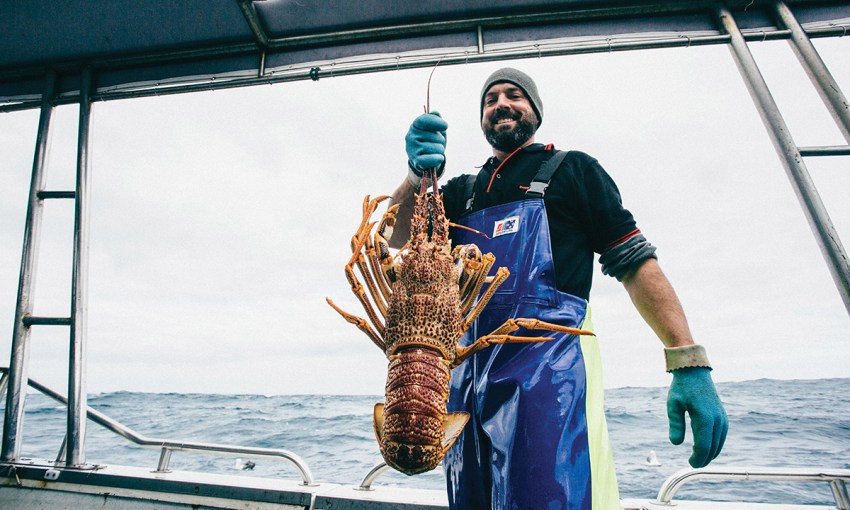SALIFE meets some of the innovative and passionate families that have weathered the ebb and flow of South Australia’s commercial fishing industry, which marks its 185th year in 2021.
Fishing with family
The South Australian colony’s very first export comprised three barrels of salted fish. The barrels were shipped to Tasmania in 1836, marking the beginning of a burgeoning industry that celebrates 185 years in 2021. During that time, it has been regional families that have driven the industry and, in turn, supported their local communities.
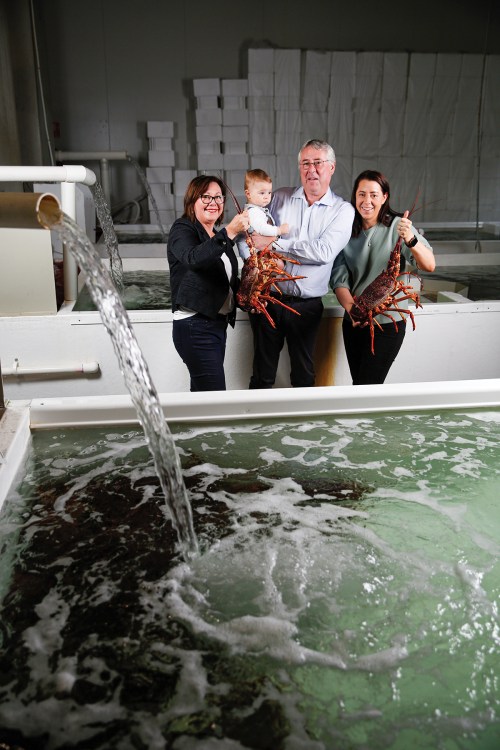
Rocking the boat
The Ferguson Australia Group is an industry-leading seafood company with a fishing fleet, dozens of staff, three seafood processing facilities and both domestic and international markets for their award-winning seafood – from southern rock lobster to King George whiting, Coorong mullet and yellowtail kingfish.
Yet, the family story has humble beginnings that date back to the 1970s, when Andrew Ferguson left school to work as a deckhand for his father Bob out of Cape Jaffa. Bob, who is now 87 and fished until he was 70, was a farmer who swapped his life on the land for one at sea.
“I used to go fishing with my dad pretty regularly as a kid,” Andrew says. “I got seasick and all the rest of it, but once I overcame that I decided it was the lifestyle I wanted. I fished with him for five years until 1980 then Debra and I bought a boat and a rock lobster fishing licence.”
Andrew met Debra at high school at Kingston. Debra later worked as a midwife, but would work on the fishing account books in her spare time. While raising their three children, Kate, Eliza and Will, the Fergusons have steadily grown their business.
Along the journey, the family has overcome their share of challenges and hardships, none more difficult than the loss of their son Will, aged 33, who had been set to eventually take over the business.
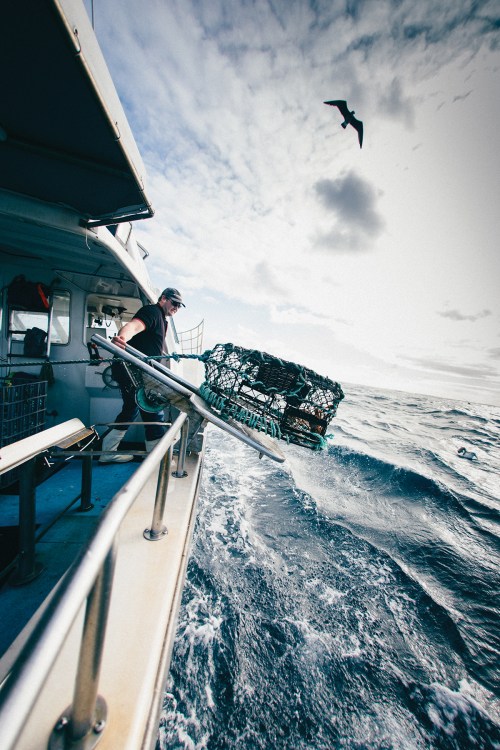
“To endure the grief and business challenges of losing Will, has been tough, but we’ve had great support from extended family, friends, and the industry,” says Debra.
“In any business, you do strike your runs of challenges, and we certainly had our fair share over the years. Andrew and I were set to retire and Will was taking over the business, but he passed away two years ago, which was a huge blow to us all. He was very good with customers; he ran the export side of things, was very good with finances and ran the business down in Port MacDonnell. We’re still not over that loss and never will be, probably. We’re a very close family.”
These days, daughter Kate is the marketing manager, who handles the export market, which has almost completely dried up with COVID-19. Kate studied commerce at university and began pursuing a career in advertising, but after helping out her parents’ business one summer, she never left.
“I think it’s been very good for our children’s confidence to go and work outside of the business and realise their skills are deep and their experience is worthwhile and valued,” Debra says.
The company continues to innovate with new products, such as lobster oil and packaged seafood products available through local supermarkets. Following the events of the past 12 months, the Fergusons have gained an increased appreciation for relationships with other families in the fishing industry, and each other.
“We like to think, the fishermen that have supported us, we’ve also supported them, so it’s a working relationship,” Debra says.
“About 70 per cent of all Australian businesses are mum-and-dad operators and I think family businesses have a strong advantage.”
Like a fish to water
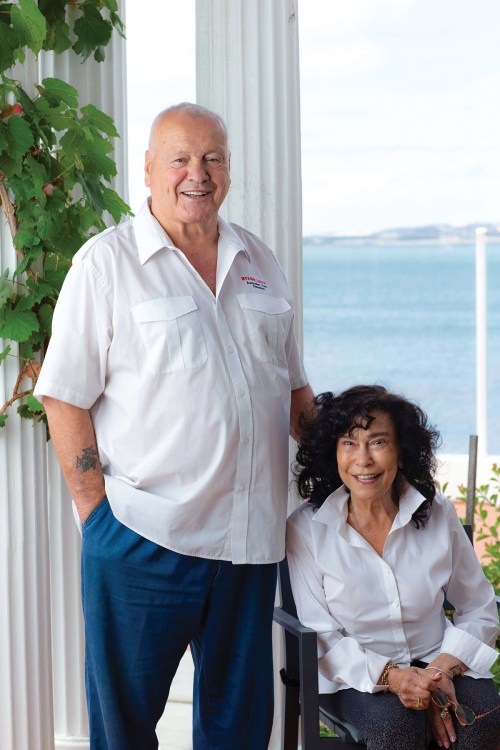
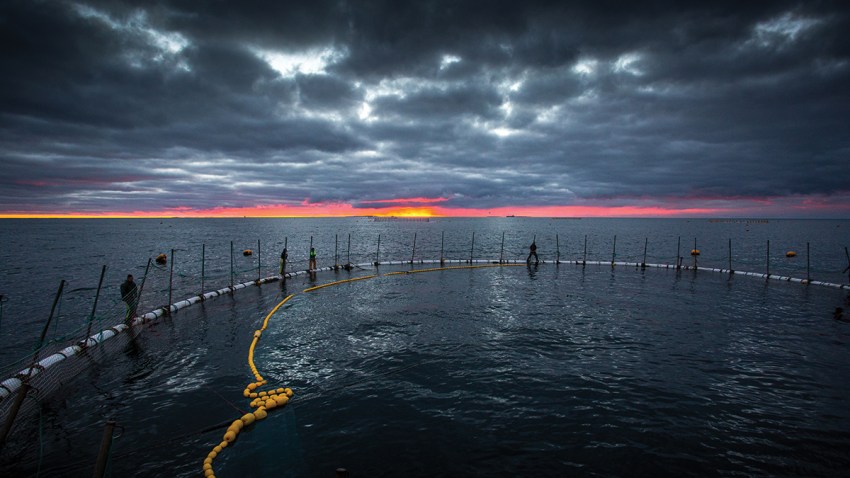
After absconding from German naval school, and serving almost a year in the French Foreign Legion, Hagen Stehr arrived in Port Lincoln in 1961 with little more than loose change in his pocket and the clothes on his back.
Hagen was on a brief stopover while working on a merchant vessel. However, he liked Port Lincoln so much he decided to jump ship and stay – it landed him in the local police station, but he says it was the best thing that ever happened to him.
“I stayed in jail for two days and Anna was working in the court. That was the first time I met her. I always say the day I came to Port Lincoln was like winning the lottery – it was the greatest thing in the world,” says Hagen.
“We’re still married after 56 years; I’m very proud of that. She has to put up with a lot, but she stuck by me. No other woman would have put up with me,” Hagen laughs.
Soon after arriving in what was then a knockabout country town, Hagen joined a fishing vessel in the era of tuna poling and before the tuna industry’s boom. It was hard work, but Hagen found great freedom out on the water.
“When we first started, it was only Anna and me. She used to do the books and I did the fishing. There was really nothing in the fishing business then – we went from poling, which was hard-going, and then we bought bigger vessels and went to the Pacific,” he says.
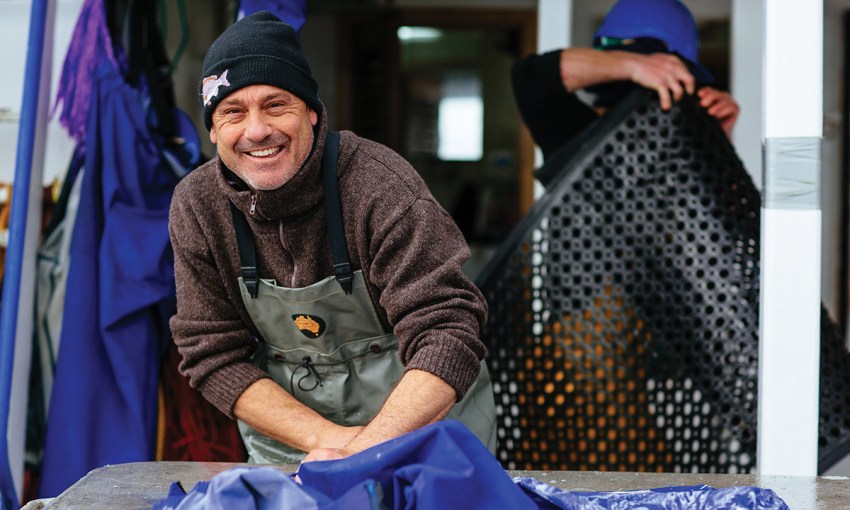
Their children Yasmin and Marcus both followed into the tuna fishing game. For three years Yasmin flew a Cessna plane spotting tuna for the Stehrs’ boats and was the only woman to do so. Marcus followed in Hagen’s footsteps and is today managing director, while still spending much of his time out at sea. “Marcus wanted to go fishing because, if you can get used to it, the lifestyle is second to none,” Hagen says.
Often referred to as “The Tuna Kaiser”, Hagen says his company Clean Seas Tuna became the first to create an artificial breeding regime for Southern Bluefin Tuna. Having long campaigned for better conditions and training of workers in the industry, Hagen is also the chairman of the Australian Maritime and Fisheries Academy.
Hagen and Anna have travelled all over the world, including visits to the lucrative Japanese tuna market where one large fish can fetch millions of dollars at auction. Now, with COVID-19 and troubles with Chinese trade, Stehr has had to pivot and look to the Australian market.
“If you close your eyes and think if I had my life over again, what would you do? I would do everything exactly the same,” Hagen says.
The world’s your oyster
For the Rowe family, oyster farming has not only helped to bolster the health of the marine environment and contribute to their coastal community on Kangaroo Island, but it has also brought them closer as a family.
Together with their daughters Jess, 19, and Kimberley, 16, Ken and Amanda Rowe operate Kangaroo Island Shellfish and The Oyster Farm Shop, with a farm that can produce up to 50,000-dozen oysters per year, although recent spat shortages have caused a significant stock problem for oyster farms Australia-wide.
“We’ve had a triple whammy,” Amanda says. “First the two-year spat shortage, then bushfires, and then coronavirus. The kids have seen us work hard through some really tough times and it gives them a different level of understanding, because they’ve been through it with us.”
The Rowes farm native Angasi oysters, Pacific oysters and more recently, native blue mussels. Unlike other forms of aquaculture, these incredible farms act as an ocean filter, while also absorbing carbon out of the water, and all without using any feed. The farm’s structures also encourage other species to create a thriving ecosystem.
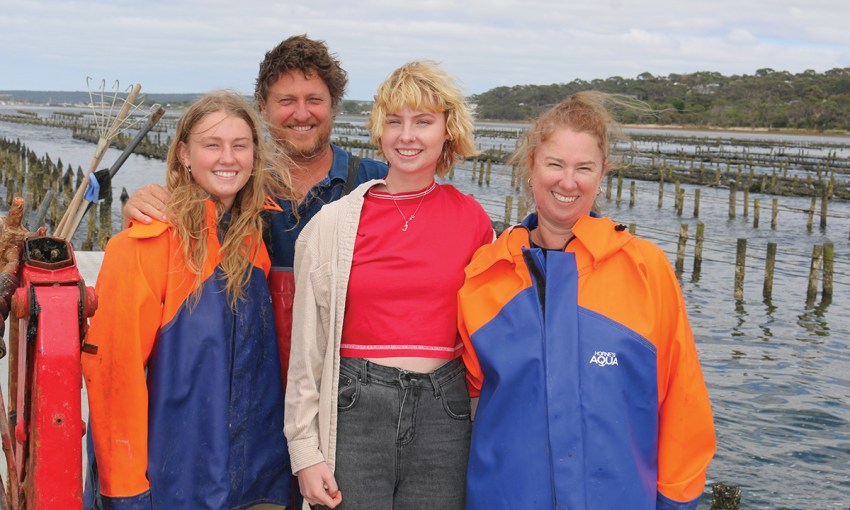
“We were attracted to oysters because they are a future food, meaning they can be farmed while positively impacting the environment. We make sure that we’re putting back into the community and the environment so that it’s sustainable. We want it to be a food source for the future,” Amanda says.
The couple previously operated a recruitment company in Adelaide. Yet, with Ken’s interest in aquaculture and Amanda having come from an Eyre Peninsula fishing family, they decided to trade in the corporate world for oyster farming. That was just over 10 years ago.
“Jess and Kimberley have had other employment opportunities here on the Island, which has boosted their confidence. We encouraged them to work for other people because it can be hard working for your parents. In your family business you might wonder if you’ve got the capability to work for others,” Amanda says.
Jess wasn’t always so keen on oyster farming. But, now studying film at Flinders University, she works with Amanda to curate the business’ marketing, videography and social media platforms.
Meanwhile, Kimberley loves the water and enjoys being out on the farm with her father. She also plays for a women’s Aussie rules team on the Fleurieu. “We wanted them to have the freedom that we couldn’t give them in the city,” Amanda says.
“They’ve enjoyed growing up on an oyster farm on Kangaroo Island, although perhaps they’ve not always enjoyed the smell of it!”
This story first appeared in the March 2021 issue of SALIFE magazine.



